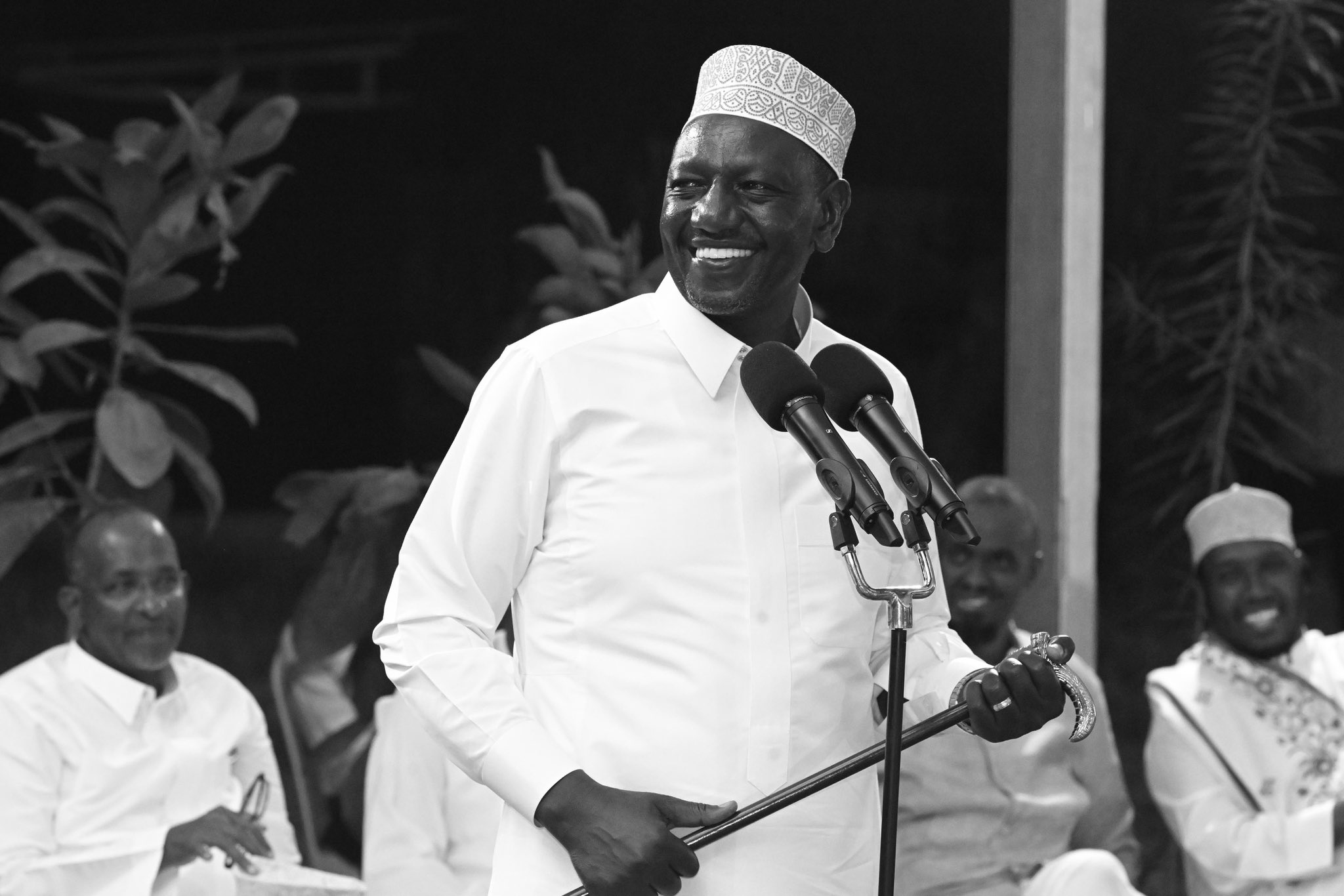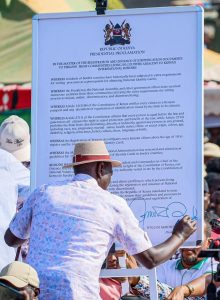Opinion
ANALYSIS: Inside President Ruto’s North Eastern Strategy for the 2027 Election
Security experts are warning that scrapping the vetting process could allow non-Kenyans from neighboring countries like Somalia, Ethiopia, and Tanzania to obtain Kenyan identification documents, potentially leading to security risks and resource strain.

President William Ruto’s recent decision to scrap the 60-year-old vetting requirement for residents of North Eastern Kenya marks a significant political and social shift, with far-reaching implications for the country’s political landscape and the 2027 General Election.
This move, coupled with the recent High Court ruling invalidating the 2019 census results for Wajir, Mandera, and Garissa counties, underscores Ruto’s strategic focus on the region as a potential game-changer in his re-election bid.
By addressing long-standing grievances and positioning himself as a champion of inclusivity, Ruto is seeking to consolidate support in a region that has historically been marginalized but holds significant electoral potential.
Historical Marginalization and Political Significance
North Eastern Kenya, comprising counties like Mandera, Wajir, Garissa, Marsabit, and Isiolo, has historically been marginalized in terms of political representation, resource allocation, and development.
The region’s residents have long decried the vetting process, which required them to undergo rigorous screening before obtaining national ID cards and passports.
This process was seen as discriminatory and a tool of systemic exclusion, limiting their ability to participate fully in national affairs, including voter registration and political representation.
The recent High Court ruling, which invalidated the 2019 census results for three North Eastern counties, further highlighted the region’s grievances.
The petitioners argued that the census figures were deliberately suppressed, undermining their social, economic, and political standing.
With the court’s decision, the door has been opened for a more accurate representation of the region’s population, which could translate into increased political influence and resource allocation.

President William Ruto signing the Presidential Proclamation on Registration and Issuance of IDs to Border Counties at Orahey Grounds in Wajir Town on February 5, 2025. PHOTO/@WilliamsRuto/
Ruto’s Strategic Move
President Ruto’s decision to scrap the vetting requirement is a calculated political maneuver aimed at addressing these historical injustices and winning the hearts of North Eastern voters.
By framing this move as a step toward inclusivity and unity, Ruto is positioning himself as a leader who listens to and acts on the concerns of marginalized communities.
This is particularly significant given the region’s past voting patterns, which have largely favored Raila Odinga and, to a lesser extent, Uhuru Kenyatta in 2017.
Ruto’s allies, including lawyer Ahmednasir Abdullahi and UDM-affiliated leaders, have been quick to capitalize on this development, projecting that the region could register up to 3.5 million new voters by 2027.
This would represent a 337.5% increase from the current 882,677 registered voters in the region. Such a surge in voter registration could significantly alter the electoral calculus, especially if Ruto succeeds in consolidating support in North Eastern Kenya.
Compensating for Mt Kenya’s Waning Support
Ruto’s focus on North Eastern Kenya must also be understood in the context of his strained relationship with the Mt Kenya region, which was instrumental in his 2022 victory. Of the 7.1 million votes he garnered in the last election, 3.5 million came from Mt Kenya.
However, his fallout with former Deputy President Rigathi Gachagua and growing discontent in the region have jeopardized his support base there.
By targeting North Eastern Kenya, Ruto is effectively adopting a “hunter-gatherer” strategy, as described by governance expert Prof. Peter Kagwanja, to compensate for potential losses in Mt Kenya.
The region’s high fertility rate and low voter registration levels present a unique opportunity for Ruto to tap into a largely untapped voter pool.
Dennis Itumbi, a key figure in Ruto’s administration, has already highlighted the demographic potential of the region, noting that Mandera’s population of 983,000 surpasses that of Nyeri (844,000) and Kirinyaga (658,000). With less than 40% of eligible voters registered in Mandera compared to over 90% in Nyeri, the headroom for new voter registration is substantial.
Political and Security Implications
While Ruto’s move has been celebrated by many in North Eastern Kenya, it has also raised concerns among political and security analysts. Critics argue that the decision could have far-reaching social, political, and security implications.
Security experts are warning that scrapping the vetting process could allow non-Kenyans from neighboring countries like Somalia, Ethiopia, and Tanzania to obtain Kenyan identification documents, potentially leading to security risks and resource strain.
Moreover, the move has fueled conspiracy theories, with some accusing Ruto of inflating the region’s population to gain political advantage.
Embakasi North MP James Gakuya who’s affiliated with impeached former Deputy President Rigathi Gachagua has dismissed Ruto’s strategy as a political gimmick, asserting that no amount of voter registration in North Eastern Kenya will save him from defeat in 2027.
Similarly, Prof. Kagwanja has cautioned that the move could exacerbate ethnic nationalism and destabilize the country.
Conclusion
President Ruto’s focus on North Eastern Kenya for the 2027 election is a multifaceted strategy driven by the need to compensate for potential losses in his traditional strongholds, to claim the mantle of inclusivity and development, and to leverage legal and demographic changes for political advantage.
However, this approach is not without its challenges, including accusations of vote manipulation and concerns over national security, reflecting the complex interplay of politics, identity, and governance in Kenya’s electoral landscape.
Kenya Insights allows guest blogging, if you want to be published on Kenya’s most authoritative and accurate blog, have an expose, news TIPS, story angles, human interest stories, drop us an email on [email protected] or via Telegram
-

 Grapevine1 week ago
Grapevine1 week agoAlleged Male Lover Claims His Life Is in Danger, Leaks Screenshots and Private Videos Linking SportPesa CEO Ronald Karauri
-

 Lifestyle2 weeks ago
Lifestyle2 weeks agoThe General’s Fall: From Barracks To Bankruptcy As Illness Ravages Karangi’s Memory And Empire
-

 Grapevine6 days ago
Grapevine6 days agoRussian Man’s Secret Sex Recordings Ignite Fury as Questions Mount Over Consent and Easy Pick-Ups in Nairobi
-

 Investigations3 days ago
Investigations3 days agoMulti-Million Dollar Fraud: Three Kenyans Face US Extradition in Massive Cybercrime Conspiracy
-

 Investigations2 weeks ago
Investigations2 weeks agoEpstein’s Girlfriend Ghislaine Maxwell Frequently Visited Kenya As Files Reveal Local Secret Links With The Underage Sex Trafficking Ring
-

 News2 weeks ago
News2 weeks agoState Agency Exposes Five Top Names Linked To Poor Building Approvals In Nairobi, Recommends Dismissal After City Hall Probe
-

 Economy2 days ago
Economy2 days agoIran Demands Arrest, Prosecution Of Kenya’s Cup of Joe Director Director Over Sh2.6 Billion Tea Fraud
-

 Business1 week ago
Business1 week agoM-Gas Pursues Carbon Credit Billions as Koko Networks Wreckage Exposes Market’s Dark Underbelly
















